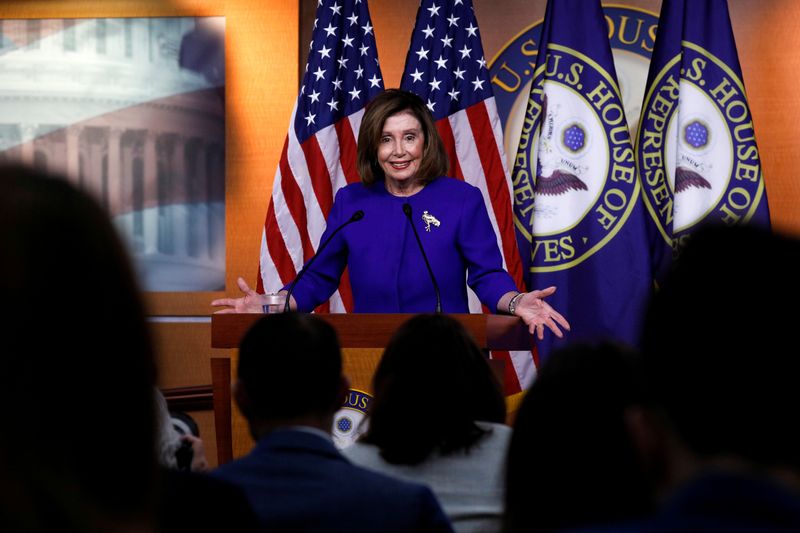By David Morgan and Richard Cowan
WASHINGTON (Reuters) - The Democratic-led U.S. House of Representatives will send formal impeachment charges against President Donald Trump to the Senate as early as next week, House Speaker Nancy Pelosi said on Friday, setting the stage for his long-awaited trial.
Pelosi, the top Democrat in the House, has been engaged in a three-week cat-and-mouse game with Senate Majority Leader Mitch McConnell over the rules for Trump's trial in the Republican-controlled Senate.
Democrats have demanded it include new witness testimony and evidence about the Republican president's pressuring of Ukraine to probe former Vice President Joe Biden, a leading Democrat running for the right to face Trump in the November election.
McConnell slammed the door on that idea this week, saying he had enough Republican votes to start the trial without a commitment to hear from additional witnesses, including former Trump national security adviser John Bolton.
Democrats are trying to convince a few moderate Republican senators to allow witnesses. One moderate, Senator Susan Collins of Maine, told reporters in her home state that she and a "fairly small group" of her fellow Republican senators are working to ensure witnesses can be called.
The Senate is expected to acquit Trump before the 2020 presidential election campaign heats up, as no Republicans have voiced support for ousting him, a step that would require a two-thirds majority.
In a letter to House Democratic lawmakers on Friday, Pelosi said a resolution could be brought up next week to appoint House "managers" to prosecute the case against Trump at the trial and to transmit the impeachment charges to the Senate.
Last month, the House adopted a rule allowing Democrats to quickly bring up a resolution naming managers, and to vote on it after only 10 minutes of debate. That means the House could vote as soon as Tuesday.
House Democrats have said Pelosi could name up to 10 lawmakers as managers, including House Intelligence Committee Chairman Adam Schiff, who spearheaded the impeachment probe, and House Judiciary Committee Chairman Jerrold Nadler.
Pelosi has declined to submit the charges, or articles of impeachment, to the Senate. She was seeking leverage for Democrats to negotiate rules of the trial, which cannot begin until the charges are transmitted.
Democrats fear McConnell plans to hold a cursory trial without hearing all the evidence. Adding to their concerns, McConnell has backed a Republican-backed resolution that would clear the way for senators to dismiss the charges before the House submits them.
"A dismissal is a cover-up and deprives the American people of the truth," Pelosi said in her letter, accusing McConnell of intending to "stonewall." She said she would consult with House Democrats on how to proceed on Tuesday.
The House impeached Trump on Dec. 18 on charges of abusing power and obstructing Congress. The investigation was sparked by a whistleblower's complaint about Trump's July 25 phone call with Ukrainian President Volodymyr Zelenskiy.
Trump says he did nothing wrong and has dismissed his impeachment as a partisan bid to undo his 2016 election win.
"Well I think it’s ridiculous. She (Pelosi) should have sent them a long time ago. It just belittles the process," Trump said in an interview with Fox News on Friday.
White House senior adviser Kellyanne Conway said White House counsel Pat Cipollone would lead Trump's defense and outside counsel Jay Sekulow would be involved.
'ABOUT TIME'
Republicans in Congress have lambasted Pelosi's approach, noting that House Democrats claimed it was urgent to impeach Trump before the December holiday break, but now are delaying.
Republican Senator Chuck Grassley accused Pelosi of throwing Congress into "unnecessary chaos," saying the delay would postpone ratification of the new United States-Mexico-Canada trade agreement.
"About time," McConnell responded when asked about Pelosi's letter on Friday. McConnell, who has vowed to coordinate the trial with the White House, has said Pelosi cannot dictate to the Senate how to conduct the proceedings.
Meanwhile, Pelosi has accused McConnell of engaging in "tactics of delay" by refusing to spell out exactly how he proposes to conduct the trial.
A McConnell aide declined to say when such a resolution might be unveiled.
Senate Minority Leader Chuck Schumer has said Democrats would force votes during the trial to have the witnesses, including Bolton, testify and for new evidence to be submitted.
"Senate Democrats are ready for the trial to begin and will do everything we can to see that the truth comes out," Schumer said in a statement.
Bolton, who was fired by Trump in September, has said he is willing to testify, although the White House could object.
Other witnesses during the House impeachment investigation testified that Bolton strongly objected to an effort by Trump's personal lawyer, Rudy Giuliani, to pressure Ukraine's government outside of regular diplomatic channels. One said Bolton referred to the arrangement as a "drug deal."
Congressional investigators believe Bolton objected to Trump's decision to delay $390 million in military aid to Ukraine and could elaborate on that, a Senate aide told Reuters this week.

When asked by Fox News if he would invoke executive privilege to prevent Bolton from testifying, Trump said: "Well, I think you have to for the sake of the office."